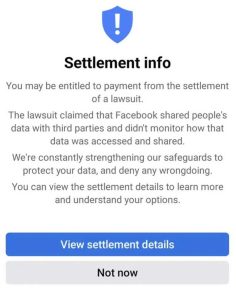Meta Pays Record $1.4B to Settle Texas Facial Recognition Suit
In a historic move, Meta, the parent company of Facebook and Instagram, has agreed to pay $1.4 billion to settle a lawsuit with Texas. This lawsuit accused the company of illegally collecting biometric data from millions of users. This settlement is the largest of its kind by a U.S. state. It marks a significant victory for privacy rights and sends a strong warning to tech giants about violating state laws.

Background of the Lawsuit
The Texas Attorney General, Ken Paxton, filed the lawsuit in 2022. He accused Meta of violating the state’s Capture or Use of Biometric Identifier Act. The lawsuit also cited the Deceptive Trade Practices Act. Meta allegedly tagged users’ faces in photos without their consent. This practice began in 2011 when Facebook introduced facial recognition technology.
“This historic settlement demonstrates our commitment to standing up to the world’s biggest technology companies,” Paxton stated. He emphasized the need to hold them accountable for breaking the law. “Any abuse of Texans’ sensitive data will be met with the full force of the law,” he added.
Understanding Texas Biometric Privacy Laws
The Texas biometric privacy law, enacted in 2009, requires companies to obtain permission before using biometric technologies. Violations can result in penalties of up to $25,000 per incident. This settlement clearly indicates the scale of Meta’s alleged violations.
This is not the first time Meta has faced legal consequences for its facial recognition use. In 2020, the company paid $650 million to settle a similar class action lawsuit in Illinois. However, the Texas settlement dwarfs that amount. It underscores the growing importance of privacy rights and the willingness of states to act against tech giants that fail to protect user data.

Meta’s Response and Future Plans
Meta’s spokesperson, Thomas Richards, expressed satisfaction with the resolution. He stated, “We are pleased to resolve this issue and look forward to exploring future opportunities to deepen our business investments in Texas.” This includes potentially developing new data centers.
The settlement comes at a time when Meta and other tech companies face increasing scrutiny. Regulators and consumers are concerned about privacy issues. With no comprehensive federal privacy law, states have taken the lead in enacting their own legislation. This is particularly true in areas like biometric data collection.
The Broader Implications of the Settlement
States like Illinois, Washington, and Texas have passed biometric privacy laws. More states are expected to follow as the public becomes aware of the risks associated with collecting sensitive personal information. The Meta settlement serves as a wake-up call for tech companies. They can no longer operate with little oversight or accountability.
For users, this settlement represents a significant victory in the ongoing battle for digital privacy rights. It sends a strong message that companies cannot simply collect and use personal data without obtaining proper consent. They must also adhere to state laws.
Looking Ahead
As the digital landscape evolves, individuals must remain vigilant about their privacy rights. They should advocate for stronger protections against the misuse of their personal information. The Meta settlement may signal more battles to come. States and citizens alike will work to hold tech giants accountable and ensure that privacy rights are upheld in the digital age.

